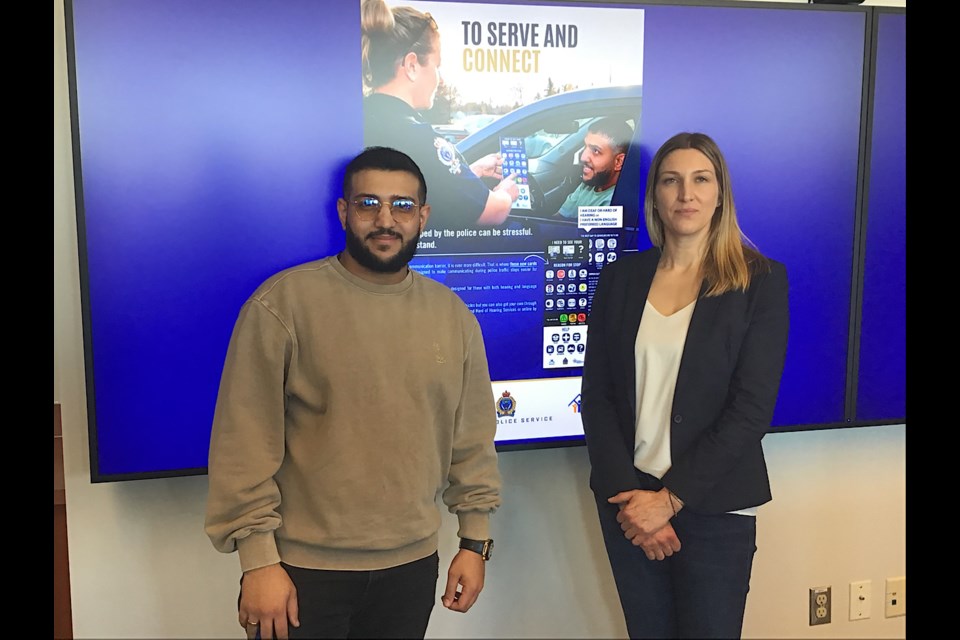REGINA - A new tool has been created to assist those who are hearing impaired to be able to interact with police officers during a traffic stop.
The Regina Police Service, along with Saskatchewan Deaf and Hard of Hearing Services and the Regina Open Door Society, have unveiled new communications cards that can be used whenever a police officer speaks with someone who is deaf or hard of hearing or whose first language is not English.
The idea is to ease those stressful situations where those who are hearing impaired encounter the police at traffic stops.
How it would work is as follows: there will a physical card available, as well as a digital card that can be accessed by your electronic device and which can be translated into 103 different languages.
All members of Regina Police Service traffic services will be provided a copy of the card and also a digital version; these would also be made available to those who are deaf or hard of hearing to carry with them to present to police if they are stopped while driving.
During a police stop, either the police officer or the driver would present the card, which shows a number of icons indicating what items should be produced such as a driver’s license or registration. There would also be icons pointing to the reason for the stop such as speeding, a seatbelt violation, careless driving, alcohol or drugs, and so on.
The police officer would then point to the icons indicating what the reason was for the stop, and whether they would be issuing a warning or a ticket.
The communication card came about following the experience of Regina resident Mustafa Alabssi when he was a high school student a number of years ago. The whole chain of events transpired when Alabssi -- innocently in his mind -- had rolled down his window to offer a child a candy bar he had in the car. Instead, the child ran away.
Soon after, police approached his vehicle. It ended up being a stressful encounter where Mustafa struggled to communicate to the officers.
“The cop continue to talk, and I kept pointing in my ear and the cop just kept talking over and over again, and I said no I can’t hear,” said Alabssi through an interpreter.
He had tried to explain he was waiting for his girlfriend to come back out of the house, and it was when she finally came out and explained Alabssi was deaf that the police apologized and were on their way.
Mustafa said if his girlfriend hadn’t come back and hadn’t told the police he was deaf, “what would I have done? Would there have been some kind of threat, would I have gone to jail?”
Word of his nerve-wracking experience with the police got back to his teacher at Winston Knoll Collegiate, and also to his school resource officer Constable Erin Black, who then set out to make improvements.
“I know Mustafa, he’s one of the liveliest students in the building,” said Black. “His face is like a ray of sunshine.”
After Black heard what had happened, she sought out to find out what other communities were doing. It was a four year long process to create the cards; Black said they had spoken to the traffic services in Edmonton which had a version of cards in use there.
The card that was developed is based on what is used in other communities, and also based on discussions and input from Saskatchewan Deaf and Hard of Hearing Services and the Regina Open Door Society.
“When we were contacted by the Regina police, we were very glad to see something like this happen,” said Victoria Flores of Regina Open Door Society. “As many of you know, being stopped by the police is not very fun and it can be very stressful. But it can be much more stressful when there’s a communication barrier… by creating a resource like this, we are able to make everyone feel welcome included, we make everyone feel welcome. They don’t have to worry so much.”
Initially, the communications cards will be available through the front desk at Regina Police Services headquarters downtown, as well as at the offices for Saskatchewan Deaf and Hard of Hearing Services and the Regina Open Door Society. The police service says they are talking with their community partners about finding other appropriate venues to make these available to the public as well.
As for whether Alabssi was proud of his own role in making this change come about, he responded “of course, 100 percent, it’s the first time in Saskatchewan."
“I’m honestly so proud.”



